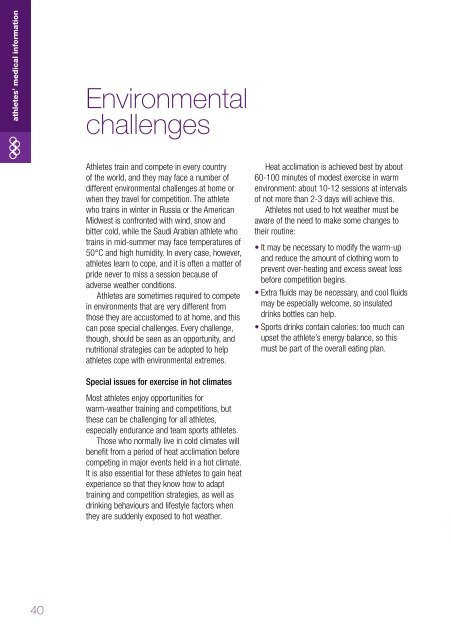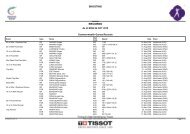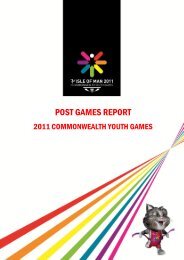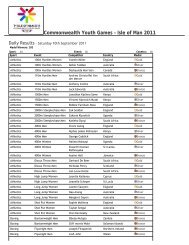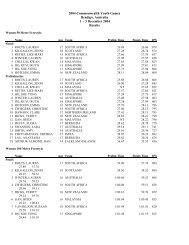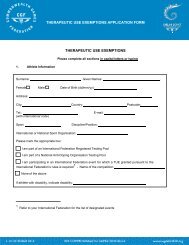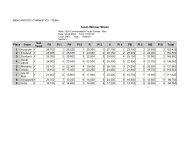Nutrition for Athletes - Commonwealth Games Federation
Nutrition for Athletes - Commonwealth Games Federation
Nutrition for Athletes - Commonwealth Games Federation
You also want an ePaper? Increase the reach of your titles
YUMPU automatically turns print PDFs into web optimized ePapers that Google loves.
athletes’ medical in<strong>for</strong>mationEnvironmentalchallenges<strong>Athletes</strong> train and compete in every countryof the world, and they may face a number ofdifferent environmental challenges at home orwhen they travel <strong>for</strong> competition. The athletewho trains in winter in Russia or the AmericanMidwest is confronted with wind, snow andbitter cold, while the Saudi Arabian athlete whotrains in mid-summer may face temperatures of50°C and high humidity. In every case, however,athletes learn to cope, and it is often a matter ofpride never to miss a session because ofadverse weather conditions.<strong>Athletes</strong> are sometimes required to competein environments that are very different fromthose they are accustomed to at home, and thiscan pose special challenges. Every challenge,though, should be seen as an opportunity, andnutritional strategies can be adopted to helpathletes cope with environmental extremes.Heat acclimation is achieved best by about60-100 minutes of modest exercise in warmenvironment: about 10-12 sessions at intervalsof not more than 2-3 days will achieve this.<strong>Athletes</strong> not used to hot weather must beaware of the need to make some changes totheir routine:• It may be necessary to modify the warm-upand reduce the amount of clothing worn toprevent over-heating and excess sweat lossbe<strong>for</strong>e competition begins.• Extra fluids may be necessary, and cool fluidsmay be especially welcome, so insulateddrinks bottles can help.• Sports drinks contain calories: too much canupset the athlete’s energy balance, so thismust be part of the overall eating plan.Special issues <strong>for</strong> exercise in hot climatesMost athletes enjoy opportunities <strong>for</strong>warm-weather training and competitions, butthese can be challenging <strong>for</strong> all athletes,especially endurance and team sports athletes.Those who normally live in cold climates willbenefit from a period of heat acclimation be<strong>for</strong>ecompeting in major events held in a hot climate.It is also essential <strong>for</strong> these athletes to gain heatexperience so that they know how to adapttraining and competition strategies, as well asdrinking behaviours and lifestyle factors whenthey are suddenly exposed to hot weather.40


